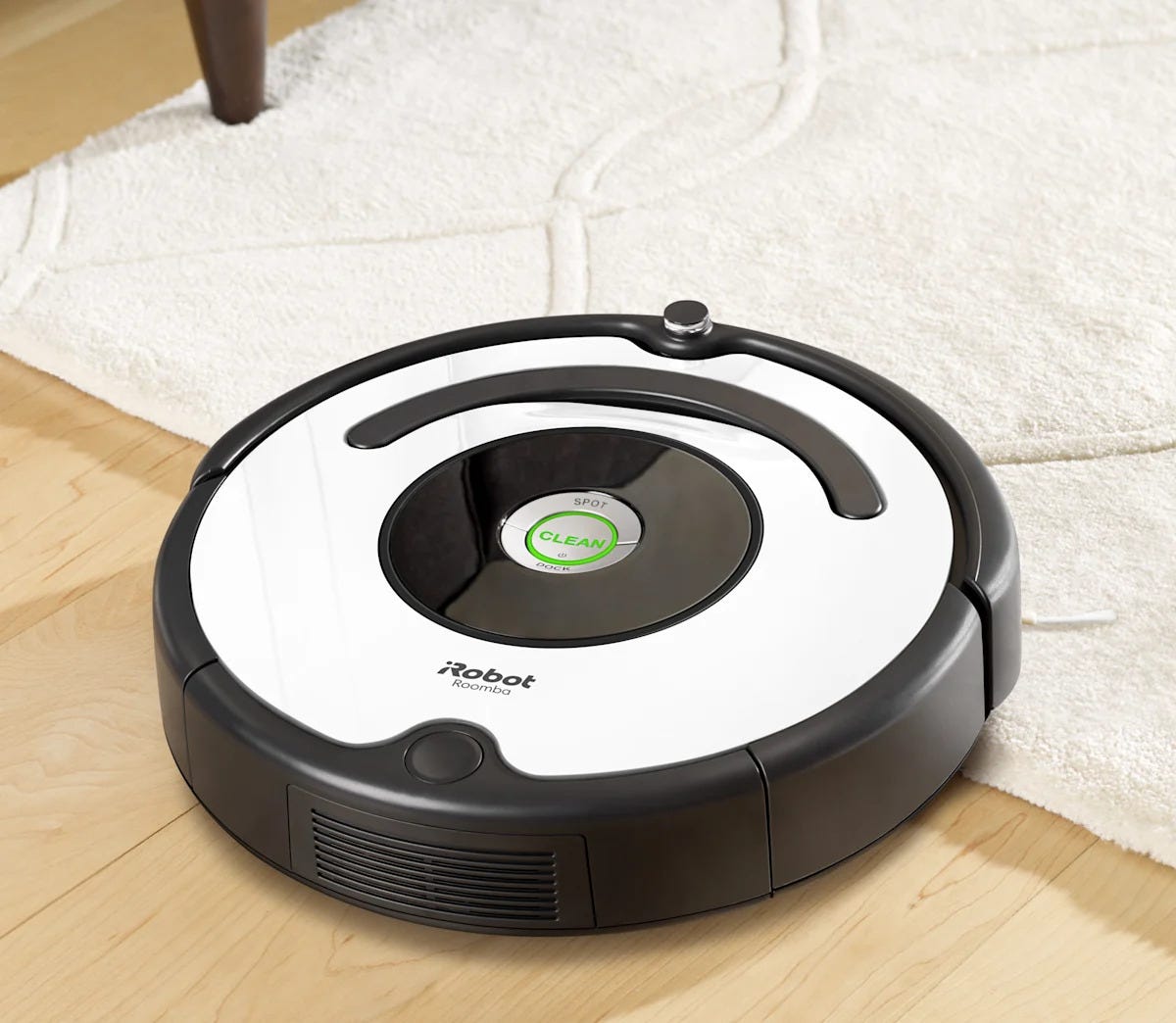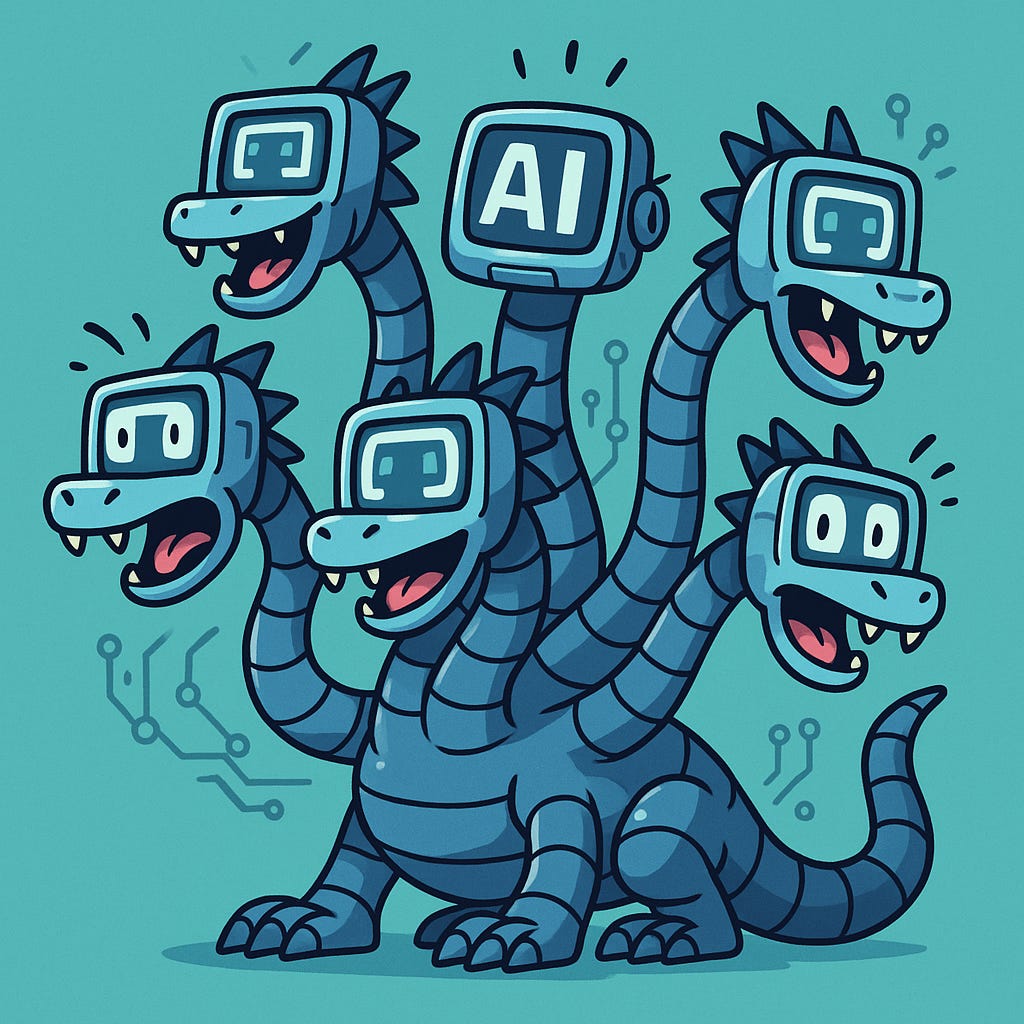Technological Progress Leaves the Dregs of Employment
Are jobs getting better as things advance, or are they potentially getting worse?
Humans spent millennia inventing things to stop laboring with their hands in the heat of the sun, only to now pay for tanning booths to artificially sun ourselves and gym memberships where we lift for no productive value at all (other than to ourselves).
This is not some sort of Luddite post calling for deliberate regression into the yesteryear of manual labor by destroying or forsaking technology. Instead, I want to acknowledge the implicit tradeoffs we make by embracing new technology.
AI Hydras for Heightened Productivity
Although I’ve been using AI to code for several years, the nature of how I use it has fundamentally changed in the past six months. When I started two years ago with Copilot in VS Code, I mostly used tab completion to finish simple or mundane things like completing a list of enums.
I now have a handful of AIs often running in parallel all day:
Codex and Cursor web agent (using Sonnet) each with several active tasks.
One Cursor IDE running Claude Code in its terminal. This is better than Cursor web agent for more complex tasks where I want to interact dynamically with the AI as it codes.
Another Cursor IDE on a different instance of my repo (akin to git worktrees) running Cursor’s interactive agent (on Sonnet). This one exists because I haven’t fully decided whether Claude Code is better or Sonnet via Cursor.
So at any one time, I might have six to ten active tasks running in parallel. I toggle between the two Cursor IDE instances to keep those AIs unblocked. When there’s a lull while they slowly produce code, I flip over to Codex and Cursor web agent to review finished code. My using this hydra of AIs only started a few months ago when I felt web agents had progressed enough to be given small tasks without needing much oversight.
I excitedly told a friend about my new workflow because it felt so powerful and efficient to be operating up to ten AIs at once. I committed far more PRs per day than I had ever done before.
But after weeks of this heightened productivity, I began realizing I went home each day less satisfied with my work. It took a few days mulling on this feeling before I had an insight about why I was enjoying my work less.
Fireside True Story™ Time: In recent years, my least favorite job in tech was when I led a project with five contract coders. The engineers on the team were pleasant and easy to work with, but relatively junior compared to my full time peers. I spent every day of every week primarily reviewing their code and giving feedback, whereas prior to hiring the team, I had worked with one other engineer to build a fully working prototype of the same product. While it’s true I had a larger positive impact on the company leading the team of contractors, I enjoyed my job a lot less because I had become a Professional Code Reviewer.
My recent heightened productivity with AIs reminds me exactly of the experience of managing five contract coders. My days are now spent almost exclusively commenting on others’ code and giving feedback. For most people with a passion for coding, this is a significant change in how work feels.
Efficiency vs. Joy
When I first moved to London, black cabs ruled the streets. Each driver was proud to have obtained The Knowledge, the ability to navigate the streets of London without maps or guidance. This skill takes typical practitioners three to four years of study. If you’ve ever lived in London, you’ll understand exactly why it takes this long. Having The Knowledge was like having a four-year college degree.
Then Uber came along, whose drivers could start working in London with zero knowledge of the city. The big computer in the sky told their supple dexterous hands exactly where and when to turn. The computer, in fact, was far superior to The Knowledge since it knew real-time traffic data and could route with an omniscience no black cab driver could possibly ever obtain. During my five years in London, the superiority of Google Maps became so clear that even black cab drivers eventually often ran it on their dashboards.
GPS routing is indubitably more efficient. Yes, we eliminated the need to study hard for four years. But we also eliminated the pride from daily demonstrating an ability that often amazed your passengers. You had an expertise for which you were respected. Now the businessman in back mostly complains that you aren’t rerouting dynamically due to an accident that GPS would have known about.
Is the world better for having computer algorithms guide traffic throughout London? The passenger experience is indubitably better. Trips are cheaper and take less time. But black cab drivers have become an ode to the past. You deliberately pay more for them the same way you pay for horse-drawn carriages in Central Park. And like those carriages, you do so knowing you’re paying more for less. You do so because it is charming, not because it’s efficient.
The same has happened many times in past centuries. Cars used to be built by engineers who built a single car at a time, who knew how to install every bit of that car and took days to do so. With the advent of assembly line production, each engineer became far more efficient. The owner of the plant became far more profitable. But each worker became less skilled. More importantly, the substance of each worker’s day became far more mundane.
You can be proud you know how to assemble a car by hand from scratch. Nobody’s proud of knowing how to tighten nut 871 two hundred times an hour.
We’re Left with the Dregs
When The Jetsons imagined our future, Rosey the robot did all the vacuuming, freeing up time for the family to do other things. Utopian visions portray a world of plenty where robots do all the hard work, freeing us up to paint, create independent film, and do beat poetry as we aggressively scale the highest cliffs of Maslow’s hierarchy.

Turns out AI came first for poetry and film, while we’re still stuck vacuuming our houses as even the most advanced of Roombas regularly send up distress flares after beaching themselves.
We thought for sure the robots and AI would take on the hard labor, leaving us to focus on white collar jobs, intellectual pursuits, and creativity. Now it’s clear that lower-paying jobs are the safer ones.
A friend of mine is a partner at a local law firm. He’s getting rid of all his paralegals because, as he puts it, “The biggest job of my paralegals is to read 10,000 pages over the weekend and summarize the notable parts.” Turns out AI’s great at that high-earning upper-middle-class job, while Amazon still struggles to automate some of the most repetitive tasks I’ve ever done.
We thought we were each unique snowflakes bursting with irreplicable creativity. Who knew what would be easiest to mimic was our art, music, and film[1] — and what was harder all this time was the mundane, repetitive, mindless work we do every week.
The joke’s on us. We are Rosey.
The Joy of Whittling
Neither the whittler nor his observer are under the illusion he’s somehow better or faster than a machine doing the same job. But we don’t judge the whittler because we understand exactly why he does it.
The point is the slow. The point is the imperfections.
Much skill and practice are needed to whittle well. We gain a sense of mastery and autonomy when we progress from novice to journeyman in any domain. This is what the whittler chases. He knows no sane person would ever pay him for his economically foolish use of time. Yet his moments whittling may be the highlights of his week.
I begin to wonder the same about my simultaneous parallel use of six to ten coding AIs throughout the day now. I’ve made myself far more productive. There’s no doubt my future employers will demand this performance of me, and that I’ll likely never again be paid to code unaugmented. But I’ve changed the nature of my job from one where each day had elements of creativity and joy into one where I’m constantly commenting on the substandard work of others.
I can’t go back — not just because no one will pay me to, but also because I know how much less I get done without AI. Pandora’s Box has been opened; the fruit of the tree of knowledge has been eaten; paradise has been lost. A one-way door has been crossed in humanity not with the well-considered push of a deliberate hand but with the accidental passing through a translucent membrane we didn’t even know was there.
Yes, we wanted flying cars. Instead we got not just 140 characters — but all of them are Tab.

[1] Angry artists will no doubt write in, fuming that there’s no way mere silicon could ever match the brilliance or innovation of Banksy. Others will say all AI work is derivative, based on others’ work, with the presumed implication that their own art, on the other hand, is direct from the sky down, deus ex machina. I do not question either of these points in my argument. They may well be 100% right. It still doesn’t overturn the fact that most people would be happy to pay $20/month for ChatGPT to generate some illustrations for their little Substack but would never pay an artist $250 every week for the same thing. I’m making an economic argument, not a moral one.



Seems like everything AI brings me back to the RSA Animate speech on what motivates us (Autonomy, Mastery, Sense of Purpose).
Using agents seems to delegate Mastery & robs me of Purpose (now that I'm a code broker).
Do we need to learn to settle for less motivation, in a word where AI productivity is crammed down our throats by leadership?
Excellent post as always, Philip! You’re one of my favorite writers in tech! ❤️
> There’s no doubt my future employers will demand this performance of me, and that I’ll likely never again be paid to code unaugmented.
This is such a good insight that I don’t see being talked about enough. Also going back to your point on the implicit tradedoffs we make, I feel like companies employing software engineers these days have an implicit expectation about AI usage, which has profound impact on the nature of the work, that I wish was more openly discussed so that we’re at least not tricking ourselves into thinking the job is still the same.
> With the advent of assembly line production, each engineer became far more efficient. The owner of the plant became far more profitable. But each worker became less skilled.
I wonder what AI will do to software engineering wages and how the assembly line example might compare. I know it’s already having a significant impact on the hiring of junior engineers, but I imagine the current compensation model even for more senior positions for people already in the industry might soon break. Thoughts?